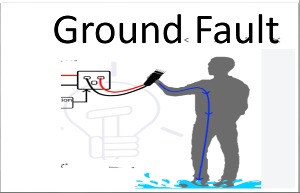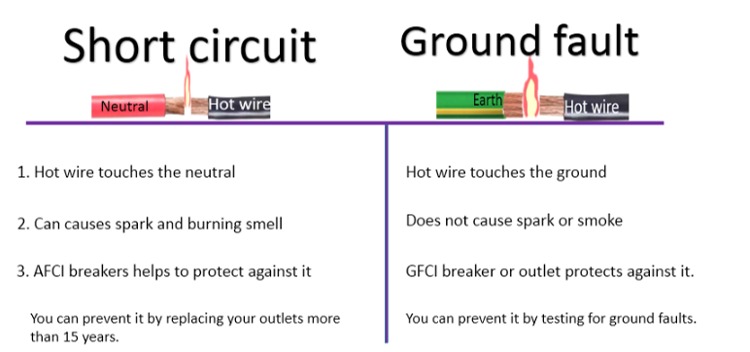
As a homeowner, you would have heard of ground faults. But do you know what it is and how to prevent the earth’s fault?
Ground faults can be dangerous and can lead to electric shock and death. But with the right safety measures, you will be safe.
This article will explain to you the bases of ground fault, its causes and how to protect your household from its danger.
What is a ground fault?
A ground fault is an electrical issue that occurs when an energized conductor comes into contact with the ground wire.
Normally, electricity flows through insulated wires. If there is damage to the wire insulator or loose connection, the current flows through that path to the ground.
Ground faults are dangerous and can lead to electric shock and death. It is more common in wet areas such as the bathroom and kitchen.
What would cause a ground fault?
There are several factors that can cause ground faults. They include:
- Damaged insulator: If the rubber coating of your electrical wire is damaged, the current can flow through it to the ground.
- Wet environment: Wet environment can cause electrical equipment to rust, leading to energy loss and ground fault.
- Damaged electrical equipment: If any of your equipment, such as switches, outlets, or appliances, is faulty, it can lead to current leakage and ground fault.
- Loose connections: Loose connections in an electrical system can cause the current to leak and flow through an unintended path.
- Poor grounding: A poor earthing system can also lead to ground faults.
How do you detect a ground fault?
You can detect ground faults through one of the following ways:
- Tripping of gfci receptacles: If a ground fault occurs, it can cause your gfci outlet to trip off.
- Electrical shock: A ground fault can cause an electric shock when someone touches a live conductor.
- Testing for ground faults. You can test for earth’s fault using a multimeter.
Is short circuits and ground faults the same?
Short circuits and ground faults are almost the same, however, there is a little difference.
In short circuits, the hot wire gets in touch with the neutral wire to cause the spark. While at ground fault, the hot wire touches the ground wire.
Below are the differences short circuits and ground faults

What is the difference between earth’s fault and ground fault?
Earth fault and ground fault is almost the same, their only difference is that in earth fault, the hot wire or cable breaks and gets into contact with earth while in ground fault, the hot wire is not broken, but gets into contact with earth or any conductor in contact with the earth.
Both faults result in high flow of current along the circuit, causing the circuit breaker or fuse to cut off the electrical current.
Dangers of ground fault
There are a few hazards associated with ground faults, they include:
- Electrical shock: Electrocution is the most common hazard associated with ground faults. It happens when you get in contact with the conductor.
- Severe burn: When an earth fault occurs, much heat is generated by the increase in the flow of electricity. If an unknown person comes into contact with the hot conductor, he or she may get a severe burn.
How to prevent and fix ground faults
You can protect against earth faults by following these steps.
- Install ground fault circuit interrupter (GFCI) devices in your home. GFCI breakers and receptacles are designed to detect and interrupt the circuit when there are earth faults. Make sure you have it for maximum protection. The national electrical code requires that you have them in your kitchens, bathrooms and outdoor wet areas.
- Make sure your home electrical system has proper earthing.
- Regularly call an electrician to inspect, maintain and replace weak outlets and wires.
- Wear your PPE, such as safety gloves while working in the power system, to reduce the risk of electric shock.
Conclusion
Ground faults occur when electrical current strays through an unintended path to the ground. It can be caused by faulty outlets, loose connections, damaged insulators, wet environments and others.
Earth’s faults can lead to electrical hazards such as shock and burn. Avoid touching appliances when your hand is wet, use quality cables for your installations, ensure your home has good earthing, and finally add a ground fault circuit interrupter (GFCI) and afci breakers to your electrical circuits.
Related articles